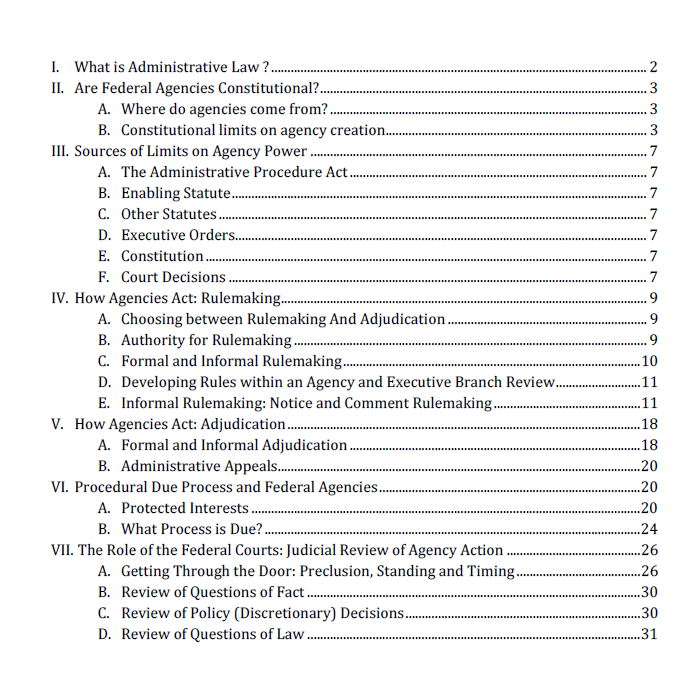Administrative Law (Federal): A Useful Explanation (32-Page Book)
Released January 31, 2012 - Written by Jill E. Family, Esquire.
Click the above "Learn More" button to read the Table of Contents, several Sample Pages and Ms. Family's curriculum vitae.
See sample pages above for the complete Table Of Contents. Alternatively, here are the main topics covered in this book:
I. What is Administrative Law?
II. Are Federal Agencies Constitutional?
A. Where do agencies come from?
B. Constitutional limits on agency creation
III. Sources of Limits on Agency Power
A. The Administrative Procedure Act
B. Enabling Statute
C. Other Statutes
D. Executive Orders
E. Constitution
F. Court Decisions
IV. How Agencies Act: Rulemaking
A. Choosing between Rulemaking And Adjudication
B. Authority for Rulemaking
C. Formal and Informal Rulemaking
D. Developing Rules within an Agency and Executive Branch Review
E. Informal Rulemaking: Notice and Comment Rulemaking
V. How Agencies Act: Adjudication
A. Formal and Informal Adjudication
B. Administrative Appeals
VI. Procedural Due Process and Federal Agencies
A. Protected Interests
B. What Process is Due?
VII. The Role of the Federal Courts: Judicial Review of Agency Action
A. Getting Through the Door: Preclusion, Standing and Timing
B. Review of Questions of Fact
C. Review of Policy (Discretionary) Decisions
D. Review of Questions of Law
Related CLE Course: to listen to, and obtain CLE/MCLE credits in those states for which it is listed, please visit our sister site, www.nlfonline.com, click on your state and scroll to this title under the "Other" heading: "Administrative Law (Federal): A Useful Explanation".
Author:
Jill E. Family is an Associate Professor of Law at Widener University School of Law,
where she is also an Associate Director of the Law & Government Institute. Previous to
joining the Widener faculty, Professor Family served as a law clerk to the Honorable
Morton I. Greenberg of the United States Court of Appeals for the Third Circuit,
practiced immigration law in the Philadelphia office of Dechert LLP and clerked for the
Honorable Stephen M. Orlofsky of the United States District Court for the District of
New Jersey.
At Widener, Professor Family teaches Administrative Law, Civil Procedure and
Immigration Law. Her research focuses on immigration law and administrative law.
Professor Family is currently studying immigration adjudication, including both
administrative procedure and the role of the federal courts.
Professor Family holds a degree in history from the University of Pennsylvania and a
joint degree in public policy and law from Rutgers University, where she was an Articles
Editor of the Rutgers Law Journal.

